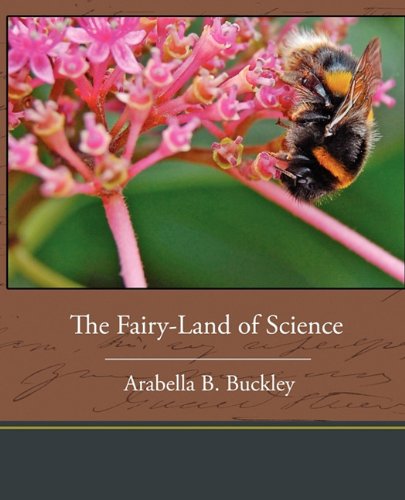How to Enter the Fairy Land of Science
How are you to enter the fairy-land of science?
There is but one way. Like the knight or peasant in the fairy tales, you must open you eyes. There is no lack of objects, everything around you will tell some history if touched with the fairy wand of imagination. I have often thought, when seeing some sickly child drawn along the street, lying on its back while other children romp and play, how much happiness might be given to sick children at home or in hospitals, if only they were told the stories which lie hidden in the things around them. They need not even move from their beds, for sunbeams can fall on them there, and in a sunbeam there are stories enough to occupy a month. The fire in the grate, the lamp by the bedside, the water in the tumbler, the fly on the ceiling above, the flower in the vase on the table, anything, everything, has its history, and can reveal to us nature's invisible fairies.
Only you must with to see them. If you go through the world looking upon everything only as so much to eat, to drink, and to use, you will never see the fairies of science. But if you ask yourself why things happen, and how the great God above us has made and governs this world of ours; If you listen to the wind, and care to learn why it blows; if you ask the little flower why it opens in the sunshine and closes in the storm; and if when you find questions you cannot answer, you will take the trouble to hunt out in books, or make experiments to solve your own questions, then you will learn to know and love those fairies.
Notes:
Listen to nature.
Folksonomies: spiritual naturalism nature wonder naturalism
Taxonomies:
/science (0.418712)
/family and parenting/children (0.381983)
/hobbies and interests/magic and illusion (0.357540)
Keywords:
Fairy Land (0.907071 (neutral:0.000000)), fairy wand (0.892269 (positive:0.333332)), fairy tales (0.862269 (neutral:0.000000)), invisible fairies (0.854660 (positive:0.405071)), sickly child (0.838795 (negative:-0.537835)), Science Listen (0.835273 (neutral:0.000000)), sick children (0.778947 (negative:-0.619645)), little flower (0.768494 (negative:-0.360721)), great God (0.765473 (positive:0.465627)), stories (0.536433 (negative:-0.054996)), history (0.535974 (positive:0.333332)), things (0.534039 (negative:-0.502485)), sunbeams (0.527984 (negative:-0.246187)), world (0.521034 (positive:0.465627)), questions (0.512472 (negative:-0.305823)), romp (0.507834 (negative:-0.604803)), grate (0.504253 (negative:-0.206070)), bedside (0.503213 (neutral:0.000000)), peasant (0.502728 (neutral:0.000000)), vase (0.500468 (neutral:0.000000)), tumbler (0.496962 (neutral:0.000000)), sunbeam (0.492995 (positive:0.447489)), governs (0.491957 (positive:0.465627)), lack (0.484815 (negative:-0.232410)), imagination (0.483240 (positive:0.333332)), happiness (0.482306 (negative:-0.619645)), fairy-land (0.480717 (neutral:0.000000)), lamp (0.479520 (neutral:0.000000)), beds (0.478843 (negative:-0.344601)), ceiling (0.478817 (positive:0.299581))
Concepts:
Fairy (0.947089): dbpedia | freebase | opencyc
Fairy tale (0.679859): dbpedia | freebase
Wind (0.658660): dbpedia | freebase
Gnome (0.638269): dbpedia | freebase
Fairyland (0.606093): dbpedia
Sunbeam (0.601850): dbpedia
Storm (0.600235): dbpedia | freebase
Pixie (0.585324): dbpedia | freebase





